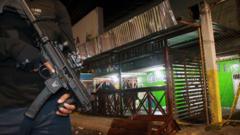Hafeez's façade of philanthropy and polo brings his downfall as he faces 16 years in a US prison for drug crimes.
**Drug Lord's Extradition: The Crossover Between Polo and the Underworld**

**Drug Lord's Extradition: The Crossover Between Polo and the Underworld**
The extravagant life of Muhammed Asif Hafeez takes a dark turn as authorities unveil his double life as a major drug trafficker.
In a startling twist, the seemingly respectable life of Muhammed Asif Hafeez—a prominent figure in London’s polo community—has unraveled, revealing a hidden world of drug trafficking. Known amongst the elite and regarded as an ambassador for the prestigious Ham Polo Club, Hafeez deftly navigated between high society and the underbelly of narcotics distribution.
Illustrated by his social connections with the British Royal Family, Hafeez, 66, painted a picture of a moral crusader. He provided authorities in both the UK and the Middle East with crucial information on rival drug gangs, professing a commitment to combatting crime. However, this guise of altruism masked an intricate drug empire, making him one of the globe's most notorious traffickers.
From his base in the UK, Hafeez orchestrated the distribution of substantial quantities of heroin, methamphetamine, and hashish, primarily sourced from Pakistan and India. His reign in the drug trade earned him the nickname "the Sultan," but his power would prove transient.
In 2023, a multi-faceted collaboration between British and American law enforcement culminated in Hafeez's extradition from the UK, where he ultimately pleaded guilty to conspiracy charges involving massive drug shipments into the US. Sentenced to 16 years in a New York federal prison, he is set to be released in 2033 after already spending six years in custody.
Hafeez's backstory is one of privilege, born into a middle-class family in Lahore, Pakistan, he later established Sarwani International Corporation, engaging in seemingly reputable business dealings. Despite his company’s façade, whispers of wrongdoing surfaced, particularly regarding unusual cash transactions.
His informant activities, which he leveraged during legal troubles in hopes of protection, were ultimately viewed by courts as a tactic to eliminate his competition rather than genuine whistleblowing.
The turning point in Hafeez’s career was a clandestine operation conducted by the US Drug Enforcement Administration (DEA). A meeting with Colombian buyers turned out to be a sting operation, leading to his downfall. While investigating his associates, authorities uncovered enough evidence to link Hafeez directly to the drug trade.
Following years of legal battles and attempts to prevent extradition to the US, Hafeez's fate was sealed when he pleaded guilty to conspiring to manufacture and distribute significant amounts of narcotics. Prosecutors underscored the stark contrast between his privileged life and the destructive impact of the drug empire he controlled.
Now, as Hafeez serves his prison sentence, the saga serves as a reminder of how power and prestige can mask the darkest secrets.




















